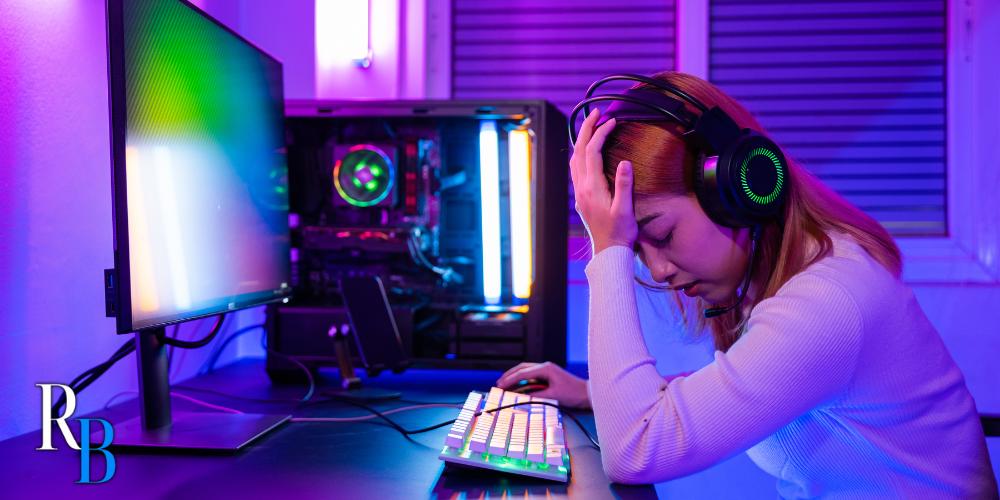VIDEO GAME ADDICTION LAWSUIT
PRACTICE AREAS

It’s important for adults and children to have hobbies for many reasons, including stress relief, creativity, relieving boredom, and improving one’s mental health. However, it is entirely possible to overdo it with certain hobbies, such as video games. Video game addiction has become an increasingly discussed topic since gaming’s inception. We’re learning more and more about the potentially harmful effects of video games, including their addictive potential.
Children, adolescents, teenagers, and adults have all been fond of video games for the past few decades. Unfortunately, as we’ve seen with social media addiction, it is entirely possible to have too much of a good thing. Parents have begun suing video game companies, claiming they intentionally designed their games to be addictive, and that they failed to warn about the possibility of addiction.
If you or someone you love has suffered harm due to video game addiction, you need the experienced team at Reich & Binstock on your side. To schedule a free consultation about your case, please call our office today at 713-622-7271.
What Is Gaming Addiction?
Video gaming addiction is a behavioral addiction characterized by excessive and compulsive engagement with video games, often to the detriment of other areas of life such as work, school, relationships, and personal health. Individuals with gaming addiction may experience an inability to control their gaming habits, leading to neglect of responsibilities, withdrawal from social activities, and negative consequences on physical and mental well-being.
This addiction can manifest in various ways, including an intense preoccupation with gaming, increased tolerance for gaming time, withdrawal symptoms when not gaming, and continued gaming despite adverse consequences.
Internet Gaming Disorder
Internet gaming disorder is a specific subtype of gaming addiction characterized by compulsive and excessive engagement with online video games. It is recognized as a behavioral addiction and typically involves persistent gaming behavior despite negative consequences in various areas of life, such as social, academic, occupational, or psychological functioning.
Child Gaming Addiction
Child gaming addiction refers to a compulsive and excessive engagement with video games that significantly interferes with a child’s daily life and functioning. It shares many similarities with gaming addiction in adults but specifically affects children and adolescents as they play games.
Child gaming addiction can manifest in various ways, such as spending excessive amounts of time playing video games, neglecting schoolwork or social activities in favor of gaming, experiencing withdrawal symptoms when not gaming, and exhibiting irritability or aggression when gaming privileges are limited.
Is Video Game Addiction Real?

Yes. Video game addiction is recognized as a real and significant issue by mental health professionals and organizations worldwide. While not everyone who plays modern games develops an addiction, some individuals can experience compulsive and excessive gaming behaviors that negatively impact various aspects of their lives.
The World Health Organization Recognizes Video Game Addiction
The World Health Organization (WHO) officially recognized gaming disorder as a mental health condition in its International Classification of Diseases (ICD-11) in 2018. Additionally, the American Psychiatric Association has included Internet Gaming Disorder in the DSM-5 as a condition warranting further study.
Video Game Addiction Statistics
With the video gaming industry having grown so much in recent years, we have a significant amount of data and research on how video games affect people. With billions of gamers worldwide, researchers have gathered the following statistics about video game addiction.
- Billions of people worldwide play video games, and up to 4% of those people are considered to be addicted to video games.
- Around 60 million people in the world currently have video gaming disorder.
- Certain symptoms associated with ADHD have also been connected with various levels of video game addiction.
Are Video Games Bad for You?
Video games and computer games are not inherently bad for you, but many of them do have the potential to be very addictive. For many people, playing video games can be an enjoyable and even beneficial pastime. However, excessive or problematic gaming habits can lead to negative consequences.
For some individuals, compulsive gaming can interfere with responsibilities, such as work, school, or relationships, leading to problems in various areas of life. Additionally, exposure to violent or inappropriate content in video games may contribute to aggressive behavior or desensitization to violence, especially in children and adolescents.
Most Addictive Video Games

Video games and online games have greatly increased in popularity over the past decade. While many games have come and gone in terms of popularity, certain games have remained at the forefront of the gaming industry for years. Examples of these games include Roblox, Fortnite, and Minecraft.
Roblox Addiction Lawsuit
Roblox is essentially a gaming platform that allows people to play hundreds, if not thousands, of user-created games. Players can also create their own games through the platform. Over 40 million people play Roblox on a daily basis, and around 67% of those players are under age 16.
While it may seem like a harmless way to pass the time, many young people develop serious problems from excessive use. Children, adolescents, and teens are more at risk of developing video game addiction because of their lack of brain development. In many cases, they haven’t fully developed the ability of self-control and executive functioning.
Additionally, Roblox also contains some adult content that is highly inappropriate for children, despite the game’s rating being E10+, which means it is suitable for everyone 10 years and older.
Fortnite Lawsuit
Fortnite is currently one of the most popular games in the world, and it has been for several years. While it may seem like a harmless game on the surface, many parents have had real problems with their children getting addicted to the game. It is free to play, but allows in-game purchases.
Many young people are able to play Fortnite purely as a healthy hobby, but others fall victim to Fortnite’s intentionally addictive design. Some design features that make Fortnite intentionally addictive include the following.
- Free-to-play, which is a low entry barrier for young people
- In-game “seasons” where players level up and earn rewards, which triggers a dopamine response
- Live events on in-game maps and regular changes to the maps
- Daily challenges to keep players coming back
- Cartoonish style, so parents aren’t worried about violent content
Minecraft Lawsuit
Minecraft is yet another very popular video game that has faced backlash in recent years from its highly addictive nature. Notable features which contribute to and encourage addiction on the platform include the following.
- Social aspect and online multiplayer
- Very immersive
- Easily accessible
- Inspires creativity
- Constant in-game growth
Gaming Companies Facing Addiction Lawsuits
Several notable game developers are facing backlash and lawsuits alleging that these companies failed to adequately warn players about the potential for addiction. Many gamers have suffered due to video game addiction, and these lawsuits seek compensation. Examples of some of the gaming companies facing lawsuits include the following.
- Nintendo
- Activision
- Blizzard
- Rockstar Games
- Epic Games
- EA Games
- Microsoft
- Ubisoft
10 Negative Effects of Video Games
While video games can offer many benefits, excessive or problematic gaming habits can lead to negative consequences. Below, we list some of the most serious negative effects of video games.
Playing Video Games All Day and Physical Health Issues
Spending long hours playing popular games can lead to a sedentary lifestyle, contributing to obesity, poor posture, poor personal hygiene, and related health problems.
Decreased Academic or Work Performance
Excessive gaming can interfere with schoolwork, job responsibilities, and productivity, leading to poor academic or work performance.
Social Isolation and Impaired Social Skills
Spending too much time gaming can lead to social withdrawal, isolation from friends and family, and difficulties in forming or maintaining relationships.
Excessive gaming can hinder the development of social skills, such as communication, empathy, and conflict resolution, particularly if most social interaction occurs within the context of online gaming.
Sleep Disturbances
Excessive gaming, especially before bedtime, can disrupt sleep patterns, leading to insomnia or poor-quality sleep.
Aggression and Behavioral Issues
Some research suggests a correlation between exposure to violent video games and increased aggression, hostility, mental disorders, or desensitization to violence, particularly in children and adolescents.
Risk of Addiction
Compulsive gaming behavior can lead to addiction, characterized by a loss of control over gaming habits, withdrawal symptoms when not gaming, and negative impacts on various areas of life.
Financial Problems
In-game purchases, subscription fees, or gambling-like mechanics in some video games can lead to financial strain or debt, especially for individuals with addictive tendencies.
Eye Strain and Vision Problems
Extended periods of staring at screens while gaming can cause eye strain, dry eyes, and other vision-related issues.
Video Game Withdrawal
Video game withdrawal refers to the symptoms and effects that individuals may experience when they abruptly reduce or stop playing video games after engaging in excessive or compulsive gaming behavior. Common withdrawal symptoms include the following.
- Cravings and intense urges to play video games
- Irritability or restlessness
- Major depressive disorder and anxiety
- Difficulty falling asleep, staying asleep, or disrupted sleep patterns
- Physical symptoms, like headaches, muscle tension, fatigue, or gastrointestinal problems
- Social withdrawal
- Loss of interest in other activities
- Impaired functioning with daily tasks and responsibilities
Are Video Games Addictive?

Yes, video games can be addictive for some individuals. Video game addiction, also known as gaming disorder or gaming addiction, is characterized by compulsive and excessive engagement with video games. Many players who are addicted to video games can also develop certain forms of mental illness as a result.
Why Are Video Games Addictive?
While not everyone who plays video games will develop an addiction, certain factors can contribute to the risk of addiction, including the following.
- Reward systems: Many video games are designed with reward mechanisms, such as points, achievements, or in-game items, that reinforce continued play and can lead to compulsive gaming behavior.
- Escapism: Video games can provide an escape from real-life stressors, challenges, or negative emotions, leading individuals to use gaming as a coping mechanism or avoidance strategy.
- Social interaction: Online multiplayer games can foster social connections and communities, leading individuals to spend excessive time gaming to maintain social relationships or to feel a sense of belonging.
- Accessibility: The widespread availability and accessibility of video games across various platforms, including smartphones, consoles, and computers, make it easier for individuals to engage in gaming behavior for extended periods.
- Psychological factors: Some individuals may be more susceptible to addictive behaviors due to underlying psychological factors such as impulsivity, low self-esteem, or difficulty regulating emotions.
Video Game Addiction Symptoms
Video game addiction, also known as gaming disorder, is characterized by compulsive and excessive engagement with video games, leading to negative consequences in various areas of life. Some common symptoms of video game addiction include the following.
- Preoccupation with gaming
- Loss of control
- Withdrawal symptoms
- Neglecting responsibilities
- Social isolation
- Physical health problems
- Deception and secrecy
- Escalation of gaming
- Interference with daily life
- Continued gaming despite negative consequences
Signs of Video Game Addiction

Video game addiction can manifest through a variety of signs, encompassing physical, mental, and emotional aspects.
Physically, individuals may exhibit signs such as fatigue, headaches, eyestrain, and repetitive strain injuries due to prolonged gaming sessions and lack of breaks. Poor posture and weight gain or loss may also be observed, as excessive gaming often involves extended periods of sitting and neglect of physical activity. Additionally, individuals may experience disrupted sleep patterns or insomnia, as gaming late into the night can interfere with the body’s natural sleep-wake cycle.
Mentally, signs of video game addiction may include a preoccupation with gaming, where thoughts about gaming dominate the individual’s mind even when they are not playing. They may have difficulty concentrating on tasks unrelated to gaming, experiencing distractibility and decreased productivity in academic or occupational settings.
Another mental sign is the loss of control over gaming habits, where individuals find it challenging to limit the amount of time they spend playing or resist the urge to play despite negative consequences. This loss of control can lead to a cycle of compulsive gaming behavior that is difficult to break.
Emotionally, individuals with video game addiction may exhibit mood changes such as irritability, agitation, or defensiveness when confronted about their gaming habits. They may become increasingly withdrawn from family members and friends, preferring the virtual world of gaming over real-life social interactions.
Feelings of guilt, shame, or self-loathing may also arise, particularly if gaming interferes with responsibilities or causes harm to relationships. Additionally, individuals may use gaming as a coping mechanism to escape from stress, anxiety, or depression, relying on the temporary relief provided by gaming to avoid facing underlying emotional issues.
Video Game Addiction Treatment
To treat addiction to video games, experts generally recommend a combination of therapeutic interventions, lifestyle changes, and support strategies. These are generally tailored to each individual’s needs. Common approaches to treating video game addiction include the following.
- Cognitive behavioral therapy
- Joining support groups
- Family therapy
- Behavioral interventions, such as setting time limits
- Lifestyle changes, such as exercise and hobbies outside of gaming
- Medications for depression, anxiety, and other mental health conditions
- Parental monitoring and support for children and adolescents
- Technology restrictions, like parental controls
How to Stop Video Game Addiction
To overcome video game addiction, individuals can start by acknowledging the problem and committing to change. Setting specific goals, such as reducing gaming time or abstaining from gaming altogether, can provide direction and motivation. Seeking support from friends, family, or mental health professionals can offer encouragement and guidance throughout the recovery process.
Implementing strategies such as creating a structured daily routine, finding alternative activities to replace gaming, and setting limits on gaming time can help gradually reduce dependence on gaming and develop healthier habits. It’s essential to address underlying issues contributing to addiction, such as stress, depression, or social isolation, through therapy, support groups, and lifestyle changes. With determination, support, and a multifaceted approach, individuals can successfully overcome video game addiction, regain control of their lives, and prioritize their well-being.
How to Stop Playing Video Games

To stop video game addiction, individuals can begin by setting clear boundaries and goals for themselves, such as limiting gaming time or abstaining from gaming altogether. Removing temptations by uninstalling games or storing gaming devices out of sight can help reduce the urge to play.
Engaging in alternative activities that provide fulfillment and enjoyment, such as exercising, pursuing hobbies, or spending time with friends and family, can help fill the void left by gaming. Seeking support from trusted friends, family members, or mental health professionals can offer encouragement, accountability, and guidance throughout the process of stopping gaming.
Developing healthy coping mechanisms for managing stress, boredom, or negative emotions can also be essential in maintaining long-term success.
Contact a Video Game Addiction Lawsuit Attorney at Reich & Binstock Today
If you or your child has suffered serious consequences from gaming addiction, it’s not too late to regain control of your life. The Houston product liability lawyers at Reich & Binstock are here to offer support and guidance. Our firm understands the profound impact that gaming addiction can have on individuals and families, and we are committed to advocating for those who have suffered harm as a result.
If you are seeking legal assistance in addressing injuries caused by gaming addiction or simply looking for resources and information, our team is here to help. With compassionate guidance and a dedication to justice, Reich & Binstock is your ally in navigating the challenges of video game addiction.
Contact us today at 713-622-7271 to learn more about how we can assist you on the path to recovery and healing.
There is never a fee unless we recover on your behalf.
Additionally, clients are not obligated to pay expenses if a recovery is not made.












